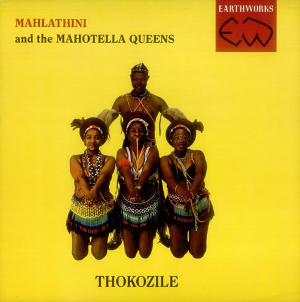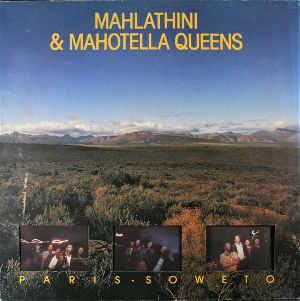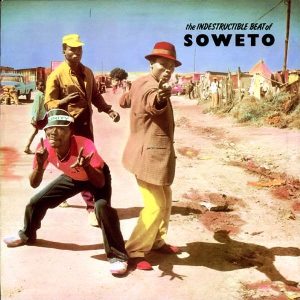
The South African music scene includes both popular (jive) and folk forms like Zulu isicathamiya singing and harmonic mbaqanga. Other popular genres are marabi, kwaito,house music, pop music, isicathamiya, gqom, rock music, hip hop and amapiano.

Ladysmith Black Mambazo is a South African male choral group singing in the local vocal styles of isicathamiya and mbube. They became known internationally after singing with American Paul Simon on his 1986 album Graceland. They have since won multiple awards, including five Grammy Awards the fifth of which they dedicated to the late former South African President Nelson Mandela.
Mbaqanga is a style of South African music with rural Zulu roots that continues to influence musicians worldwide today. The style originated in the early 1960s, and blends traditional African vocal styles and melodies with European and American popular music.

The Mahotella Queens is a South African female band formed in 1964 by music producer Rupert Bopape, consisting of Hilda Tloubatla, Nobesuthu Mbadu, and Amanda Nkosi. The group is noted for their distinct vocal harmony sound, guitar-led mbaqanga music, and fast stage dancing.

Simon "Mahlathini" Nkabinde was a South African mbaqanga singer. Known as the "Lion of Soweto", Nkabinde is the acknowledged exponent of the deep-voiced, basso profundo "groaning" style that came to symbolize mbaqanga music in the 1960s. Nkabinde was also a very active live performer in South Africa, recording and performing with the Mahotella Queens and the backing Makgona Tsohle Band from 1964 to 1971, and then again from 1983 to 1999. The Mahlathini and the Mahotella Queens act was propelled into international stardom in the wake of Paul Simon's 1986 Graceland album.

Mahlathini and the Mahotella Queens were a South African mbaqanga supergroup made up of the three musical acts linked together by talent scout and record producer Rupert Bopape at the Gallo Recording Company in Johannesburg, South Africa in 1964. The group composed of the following three distinct parts:

Duck Rock is an album released by British impresario Malcolm McLaren. It was originally issued in 1983 by Charisma Records, Virgin Records, and Chrysalis Records, and later re-released on CD in 1987. The album mixes up styles from South Africa, Central and South America, the Caribbean, and the United States, including hip hop. The album proved to be highly influential in bringing hip hop to a wider audience in the United Kingdom. Two of the singles from the album, "Buffalo Gals" and "Double Dutch", became major chart hits on both sides of the Atlantic. Duck Rock was dedicated to Harry McClintock, better known as Haywire Mac. The album artwork was designed by Dondi White and Nick Egan, with the illustration by Keith Haring.
The Makgona Tsohle Band was a South African instrumental band that is noted for creating the mbaqanga music style. Mbaqanga is an acculturated popular South African music that emerged in the 19th century. Mbaqanga is also referred to as township jive. The group was formed in 1964 at Mavuthela, and became the Mavuthela house band. It garnered success by backing fellow Mavuthela-Gallo stars, Mahlathini and the Mahotella Queens. It is often referred to as the South African equivalent to Motown's The Funk Brothers.

Gallo Record Company is the largest record label in South Africa. It is based in Johannesburg, South Africa, and is owned by Arena Holdings. The current Gallo Record Company is a hybrid of two South African record labels, rivals between the 1940s and 1980s: the original Gallo Africa (1926–85) and G.R.C.. In 1985 Gallo Africa acquired G.R.C.; as a result, Gallo Africa became known as Gallo-GRC. Five years after the acquisition, the company was renamed Gallo Record Company.

The Township Idols is a 2003 compilation album by the South African singing group Mahotella Queens. The group started recording for Gallo Record Company in 1964, initially under different group names in addition to the "Mahotella Queens" name. Although they are prolific recording artists, the songs collected on this album are mainly from the 1990s, licensed from the US-based Shanachie Records.
Hilda Semola Tloubatla is a South African mbaqanga singer, and the lead singer of the acclaimed group the Mahotella Queens. Tloubatla was born in Payneville, South Africa before moving to kwaThema township in 1951 as a result of the apartheid government's 'Group Areas Act' in the country.
Nobesuthu Gertrude Mbadu was a South African mbaqanga singer, and a singer in the acclaimed group the Mahotella Queens.

Thokozile is an album by the South African mbaqanga group Mahlathini and the Mahotella Queens, released in 1987. The album was a reunion of Mahlathini with the backing Makgona Tsohle Band and three of the original Queens, Hilda Tloubatla, Nobesuthu Mbadu and Mildred Mangxola. The album featured re-recordings of older songs such as "Umculo Kawupheli" and "Sithunyiwe" ("Thokozile"). The album propelled the group into immediate international stardom when it was issued internationally on the Earthworks label.

Paris – Soweto is a 1987 album by the South African mbaqanga group Mahlathini and the Mahotella Queens. The album was recorded just after the group reunited in 1986, and was one of the first albums to be recorded specifically for the international audience. The album was recorded in Paris and released internationally on the Celluloid label, and under the group's long-standing Gallo label in South Africa. The first single, "Kazet" became one of the group's signature tunes.

Mathaka Vol 1 is a 1983 album by the Makgona Tsohle Band, the instrumental backing group for Mahlathini and the Mahotella Queens, all of whom were based as musicians in the Mavuthela Music subsidiary of Gallo Africa.

Tsamaya Moratuoa is a 1980 album by South African female band Mahotella Queens. The album was one of the first to feature a more modern form of mbaqanga, implementing a 1980s drum backing with solid drumsticks. The album featured songs such as "Tsamaya Moratuoa," "Mpulele," "Re Basadi Kaofela" and the Sotho-traditional hymn "Seteng Sediba".
West Nkosi was a South African music producer, saxophonist and songwriter.

The Indestructible Beat of Soweto, later repackaged as The Indestructible Beat of Soweto Volume One, is a compilation album released in 1985 on the Earthworks label, featuring musicians from South Africa, including Ladysmith Black Mambazo and Mahlathini. In 2020, it was ranked number 497 on Rolling Stone's 500 Greatest Albums of All Time.
Jaiva, Township jive (TJ), Soweto jive, Soweto sound or Soweto beat is a subgenre of South African township music and African dance form that influenced Western breakdance and emerged from the shebeen culture of the apartheid-era townships.













